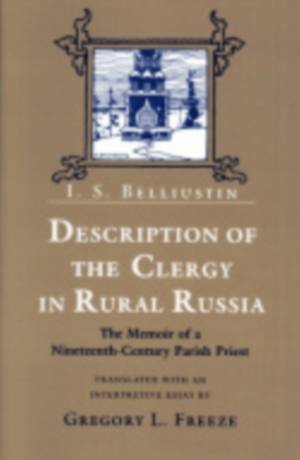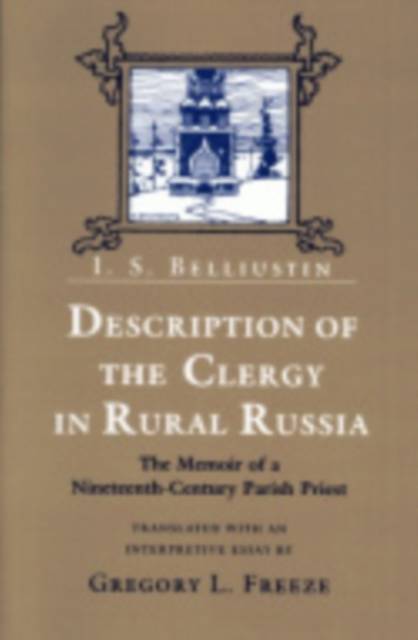
- Retrait gratuit dans votre magasin Club
- 7.000.000 titres dans notre catalogue
- Payer en toute sécurité
- Toujours un magasin près de chez vous
- Retrait gratuit dans votre magasin Club
- 7.000.0000 titres dans notre catalogue
- Payer en toute sécurité
- Toujours un magasin près de chez vous
Description of the Clergy in Rural Russia
The Memoir of a Nineteenth-Century Parish Priest
I S BelliustinDescription
Religious life has been perhaps the least explored and most poorly understood aspect of imperial Russian history. This annotated translation of a dissident priest's exposé of the parish clergy adds significantly to our knowledge, providing a graphic picture of the Orthodox church in the mid-nineteenth century. For the first time, we are able to grasp the profound importance of the church in the everyday lives of ordinary men and women.I. S. Belliustin's Description of the Clergy in Rural Russia was published abroad and smuggled back into the empire in 1858, on the eve of the Great Reforms. Its shocking depiction of a church pervaded by venality and ignorance created a sensation in high society and government circles. It generated a new sense of self-awareness among the younger clergy and sparked a reform movement that climaxed in the years just before the 1917 Revolution. Much more than a chapter in the history of Russian Orthodoxy, Belliustin's memoir is a major document in Russian social history. Throughout, the author ranges beyond the seminary and the parish to touch on almost every aspect of village life. Gregory Freeze has translated this text and supplied extensive annotations. His introduction is a masterly--and long-needed--survey of the church's role in the social and political life of imperial Russia.Written by a wry and trenchant observer, this portrait of rural Russia will be read with interest by students and scholars of Russian history, of the Orthodox church, and of the social and religious history of nineteenth-century Europe.
Spécifications
Parties prenantes
- Auteur(s) :
- Editeur:
Contenu
- Nombre de pages :
- 224
- Langue:
- Anglais
Caractéristiques
- EAN:
- 9780801493355
- Date de parution :
- 08-11-85
- Format:
- Livre broché
- Format numérique:
- Trade paperback (VS)
- Dimensions :
- 152 mm x 229 mm
- Poids :
- 326 g

Les avis
Nous publions uniquement les avis qui respectent les conditions requises. Consultez nos conditions pour les avis.






